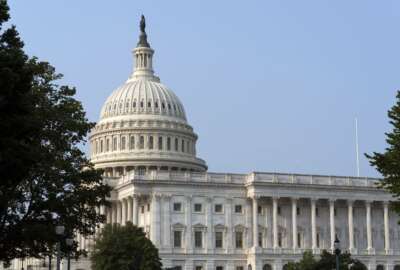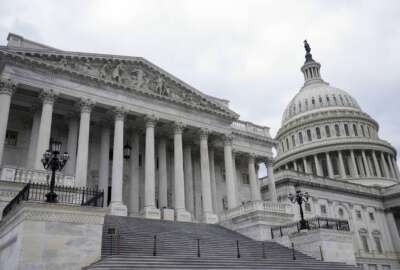
Congress returns to work as the White House prepares to release the 2024 budget
The continuous showdown continues on Capitol Hill this week. Congress returns to session, just days before the expected White House release of its 2024 budget r...
The continuous showdown continues on Capitol Hill this week. Congress returns to session, just days before the expected White House release of its 2024 budget request. For the outlook, the Federal Drive with Tom Temin talked to WTOP Capitol Hill correspondent Mitchell Miller.
Interview transcript:
Tom Temin
And that budget is due now, I guess on time, is considered March 9. A month late is now on time. That’s the White House, not Congress. But that will start to really inform the talk, won’t it?Mitchell Miller
It will, the budget will come before it divided Congress now, of course. So while it’s something of a wish list every year when the White House releases it, it is that starting point for what will be months of battling over spending priorities. And there’s been little argument over federal pay raises for feds over the last few years with the democratically controlled House and Senate. But this is going to be different. Some Democrats, including Virginia’s Gerry Connolly (D-Va.) are seeking that pay raise of as much as 8.7%. But the Biden administration has generally followed the federal pay formula over the last few years, so it’s likely to come in around 5.2%. That previous pay raises, in recent years, essentially took place by default, since most Democrats didn’t advocate a specific number other than people in the Virginia and Maryland delegations around the Washington area. But House Republicans are likely to push back on a pay raise, and that could lead to a debate over a specific number. Also, GOP House leaders are likely to press to require feds to require more payments toward the retirement, they could also push for a reduction in the federal share of premiums. So we could get a hint of all of this to come when the House Budget Committee starts to put together general plans for their appropriation bills.Tom Temin
Yes, old ideas about the contributions to retirement that comes and goes periodically. But there are Republican cosponsors, I believe, of that 8.7% pay raise bill.Mitchell Miller
Yes, there are some. So there is some support, it’s going to be interesting to see, you have some people that will go along with it and then you have the hard right of the GOP in the House, which is really pushing back and wants to make a statement on a lot of these issues. A lot of them, as you’re well aware, criticize the federal government is club fed, and they want to pull back on funding for various federal agencies, and of course, that will all roll into the whole debate related to the debt ceiling. So I think we’re going to see again, this ebb and flow of arguments over the debt ceiling and whether House Republicans are going to get cuts in spending plans to go along with raising the debt ceiling.Tom Temin
I guess club fed is like club med with frumpy clothes. And some hearings coming up this week, Veterans Affairs is having some issues on hiring and vetting employees. And they’ve just been struggling with filling their ranks out. And this is going to come up?Mitchell Miller
Yes, the House Veterans Affairs Committee holds a hearing on Tuesday. And this comes after, as you mentioned, this hiring of new workers as the VA tries to keep up with the number of increasing number of patients. The VA is trying to make progress in hiring, and a top VA official said last week that the Veterans Health Administration has already hired more than 18,000 new employees in this fiscal year. And that brings the total number of employees to the VHA to nearly 390,000. The VHA has a goal of a 3% increase in staffing by the end of this fiscal year, they expect to meet that goal. They’re planning to hire as many as 50,000 employees by the end of this fiscal year. Also, a good bit of news for the Veterans Administration. There’s been a lower attrition rate, so they are getting fewer employees that they have to replace. Obviously, that’s a big issue at many of the agencies across the federal government.Tom Temin
Right. And that [Promise to Address Comprehensive Toxics (PACT)] act, I think put a big workload on them, more patients and more people applying for benefits. And so I think that might be part of the factor there. And then there’s also quality of life in the military to backup the lifecycle a notch. That hearing is also coming up in appropriations?Mitchell Miller
Yes, this is a House Subcommittee of appropriations. And literally, the hearing is called quality of life in the military. That again, will be on Tuesday. Lawmakers hearing from representatives of all the armed services. This is an issue that’s been getting a lot of attention from the armed services committees as well. There’s been a lot of complaints about military housing, the quality of the housing, the accessibility and the need to increase pay for junior enlisted service members. Many young military families have had a hard time making ends meet with inflation being so high, just doing basic things like paying for groceries. There’s also a new subcommittee of the House Armed Services Committee that’s going to be led by Don Bacon (R-Neb.), and it is going to specifically address these quality of life issues. Supporters say, dealing with these issues is critical to recruitment and making sure there are adequate numbers of U.S. military personnel in the armed forces.Tom Temin
Yes, so the army has missed its recruiting goals and they’re working on a lot of fronts to try to up in that situation. We’re speaking with Mitchell Miller, he’s Capitol Hill correspondent for WTOP. And I wanted to ask you about, it was a flurry of news, a couple of weeks ago with Maryland and Virginia, their congressional delegations vying for the new FBI headquarters. This is like 10-15 years now this has dragged on, big interruption in the Trump administration era. So when is that going to all happen and this Congress have any say, ultimately?Mitchell Miller
Well, I know that this has been bouncing around for many years. And then of course, it intensified under the Trump administration and there was a back and forth about, whether or not it would move from Pennsylvania Avenue to Maryland and Virginia. But now, I think we are really getting to the nitty gritty on this. It’s the General Services Administration, that of course, is going to make this final decision. And I think the reason that we’re seeing so much movement, is because the GSA had to reach out to both, the Maryland and Virginia congressional delegations. That’s why in these past few weeks, you saw them fiercely going back and forth over the criteria for picking a new site outside of D.C., either Virginia or Maryland suburbs. The Virginia delegation wants it near Springfield, they argue that it’s near Quantico and the FBI testing area there. And they just feel that there are a lot of other issues that point to that, including transportation that make it a better site there. And of course, on the Maryland side, they say, no, that’s not a good site. They want it in Landover or Greenbelt. And interestingly, there are five criteria that are all going to be added up to 100 points for ranking the sites, and the GSA panel has to decide how they’re all going to be meted out. One of them that’s been receiving a lot of attention recently, is one in connection with, whether or not it’s doing enough to help people in the area that are underserved. And this is one of the areas, it’s only going to get about 15 points and providing sustainability or livability of the communities around where this FBI headquarters would be placed. Maryland says that things are getting shifted a little bit, and that they felt that they had an advantage in Prince George’s County over Virginia. Virginia says back and forth, for the reasons I just mentioned, they feel that they have the best sight. So I think to your original question, when is this all going to be finally decided? The GSA originally indicated that they were going to try to get it done by the end of the past fiscal year, that obviously didn’t happen. But I do think they are going to get closer to a final decision in the coming months. And we could see a final decision, which of course, will come under challenges. But that could come later this year.Tom Temin
I’m picturing Barbara Mikulski coming out of retirement and flying in there and saying, guys, this is where it’s got to go.Mitchell Miller
She would be in there for sure.Tom Temin
And of course, the GSA administrators from Missouri, so she doesn’t have a horse in the race, that might mitigate for an objective decision. Interesting, though, does anyone raise the question of the community served criterion for the ranking, that most of the employees will just move with the FBI that are already there?Mitchell Miller
Right, exactly. That’s a point that a lot of people are making. They’re going to have to move, now the various congressional delegations point out, that this will have a spin off of a lot of other implications, obviously, related to transportation and other hiring and other businesses that may spin off with development and that type of thing. But other people say, Well, the FBI is fairly enclosed. And it’s not necessarily going to have the type of spin off effect that many other developments might have. So it’s an interesting back and forth, as you indicated, this has been going on for more than a decade. But I think we are finally getting down to the final point where we’re going to hit the finish line on this.Tom Temin
Well, if you want to see the spin off effect, drive roads surrounding the new DHS headquarters. And if you can find anything that’s pleasant and developed around there, let me know, because I’ll go back and take another look. And just real quickly, the [Stopping Home Office Work’s Unproductive Problems (SHOW UP)] act from legislation from the House Republicans, is that going anywhere?Mitchell Miller
Well, the bill would require the number of federal employees returning to their offices, to get back to the level that they were before the pandemic in 2019. As you know, the House passed this legislation a few weeks ago, and James Comer (R-Ky.) urged the Senate to quickly take up the bill, but it’s opposed by many Democratic senators and Senate Majority Leader Chuck Schumer (D-N.Y.) has it’s shown no indication, he plans to bring it up anytime soon. So at this point, it’s doubtful the legislation requiring federal workers to physically get back to their offices, will be passed in the Senate. Advocates of telework for federal employees continue to say, there can be a balance with feds working both, at home and in the Office. And of course, the number of feds approved for telework, in the past several years, has really gone up, more than doubling from just under 500,000 few years ago, to now more than a million.
Copyright © 2024 Federal News Network. All rights reserved. This website is not intended for users located within the European Economic Area.
Tom Temin is host of the Federal Drive and has been providing insight on federal technology and management issues for more than 30 years.
Follow @tteminWFED
Related Stories





